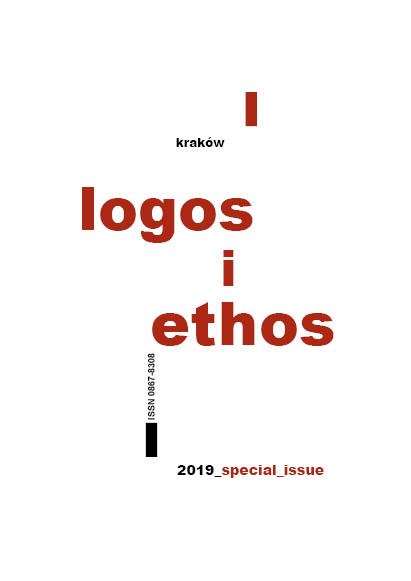Gogacz – Judycki. Two concepts of the individuality of a human person
DOI:
https://doi.org/10.15633/lie.3469Słowa kluczowe:
pluralism, dualism, human, individuality, Thomism, PhenomenologyAbstrakt
The aim of the article is presentation of two concepts of human individuality which have arisen in modern Polish philosophy of Mieczysław Gogacz and Stanisław Judycki. It is an attempt to look at the problem from two different philosophical perspectives: Thomistic metaphysics and phenomenological epistemology. Metaphysical approach is searching for an answer to the question about human individuality in their ontic structure, whereas phenomenological approach focuses on the analysis of a direct experience. As reason of individuality, Gogacz indicates potential intellect (passive) subjected in a substantial form (soul). Judycki maintains that this reason is the concept of God, according to whom He creates a soul of every human being as radically different from all other human souls, unique. Presented theories develop from a different way of understanding a human being. Gogacz’s theory has a substantial character, refers to the concept of a human of Aristotle, Boethius and St. Thomas Aquinas. Judycki’s concept is a relational approach, modified by elements of substantialist philosophy. He refers to relational approach of Plato, Saint Augustine and Descartes as well as substantialist theories of Aristotle and St. Thomas Aquinas. Thomistic and henomenological approaches to individuality introduce fundamentally different and essential substance to philosophy concerning human beings.
Bibliografia
Gogacz M., Elementarz metafizyki, Warszawa 1998.
Gogacz M., Istnieć i poznawać, Warszawa 1976.
Gogacz M., Wokół problemu osoby, Warszawa 1974.
Gogacz M., Wprowadzenie do etyki chronienia osób, Warszawa 1998.
Judycki S., Bóg i inne osoby. Próba z zakresu teologii filozoficznej, Poznań 2010.
Judycki S., Świadomość i pamięć. Uzasadnienie dualizmu antropologicznego, Lublin 2004.
Kijewska A., Filozof i jego muzy. Antropologia Boecjusza – jej źródła i recepcja, Kęty 2011.
Krąpiec M. A., Zagadnienie jednostkowienia bytów materialnych, „Roczniki Filozoficzne” 1958, vol. 6 bull. 1, pp. 97–148.
Stępień A. B., Wprowadzenie do metafizyki, Kraków 1964.
Tomasz z Akwinu, Traktat o człowieku. Suma teologii 1,75–89, trans. and ed. S. Swieżawski, Kęty 1998.
Wojtyła K., „Osoba i czyn” oraz inne studia antropologiczne, Lublin 2000.
Ziemiński I., Życie wieczne. Przyczynek do eschatologii filozoficznej, Kraków–Poznań 2013.
Judycki S., Samoświadomość i unikalność osób ludzkich, http://www.kul.pl/materialy-do-pobrania,art_19301.html (02.04.2014).
Thomas Aquinas, Contra Gentiles. On the Truth of the Catholic Faith, Book Two: Creation, translated by James F. Anderson, New York, 1955–57, http://dhspriory.org/thomas/ContraGentiles2.htm#81 (02.04.2014).
Pobrania
Opublikowane
Numer
Dział
Licencja
Prawa autorskie (c) 2020 Bożena Listkowska

Utwór dostępny jest na licencji Creative Commons Uznanie autorstwa 4.0 Międzynarodowe.
Autorzy publikujący w czasopiśmie udzielają jego wydawcy zgody o następującej treści:
- Autor zachowuje autorskie prawa majątkowe do utworu, a jednocześnie udziela wydawcy czasopisma zgody na jego pierwszą publikację w wersji drukowanej i wersji online na licencji Creative Commons Uznanie autorstwa 4.0 Międzynarodowe oraz zgody na wykonywanie opracowań, w tym przekładów.
- Autor ma możliwość udzielania zgody niewyłącznej na opublikowanie utworu w wersji, która ukazała się w czasopiśmie (np. zamieszczenia go w repozytorium instytucjonalnym lub opublikowania w książce), wraz z informacją o jego pierwszej publikacji w czasopiśmie.
- Autor może umieścić swój utwór online (np. w repozytorium instytucjonalnym lub na swojej stronie internetowej) jeszcze przed zgłoszeniem utworu do czasopisma.

